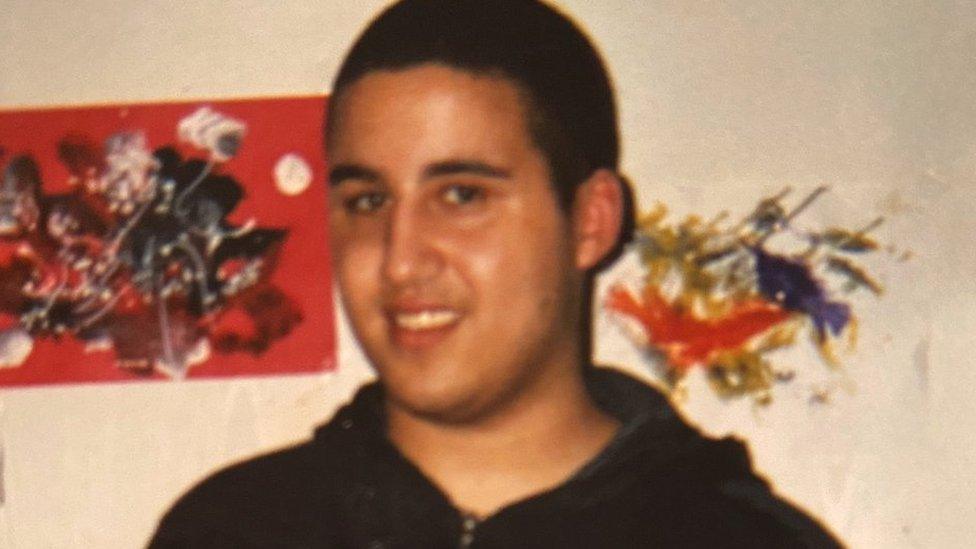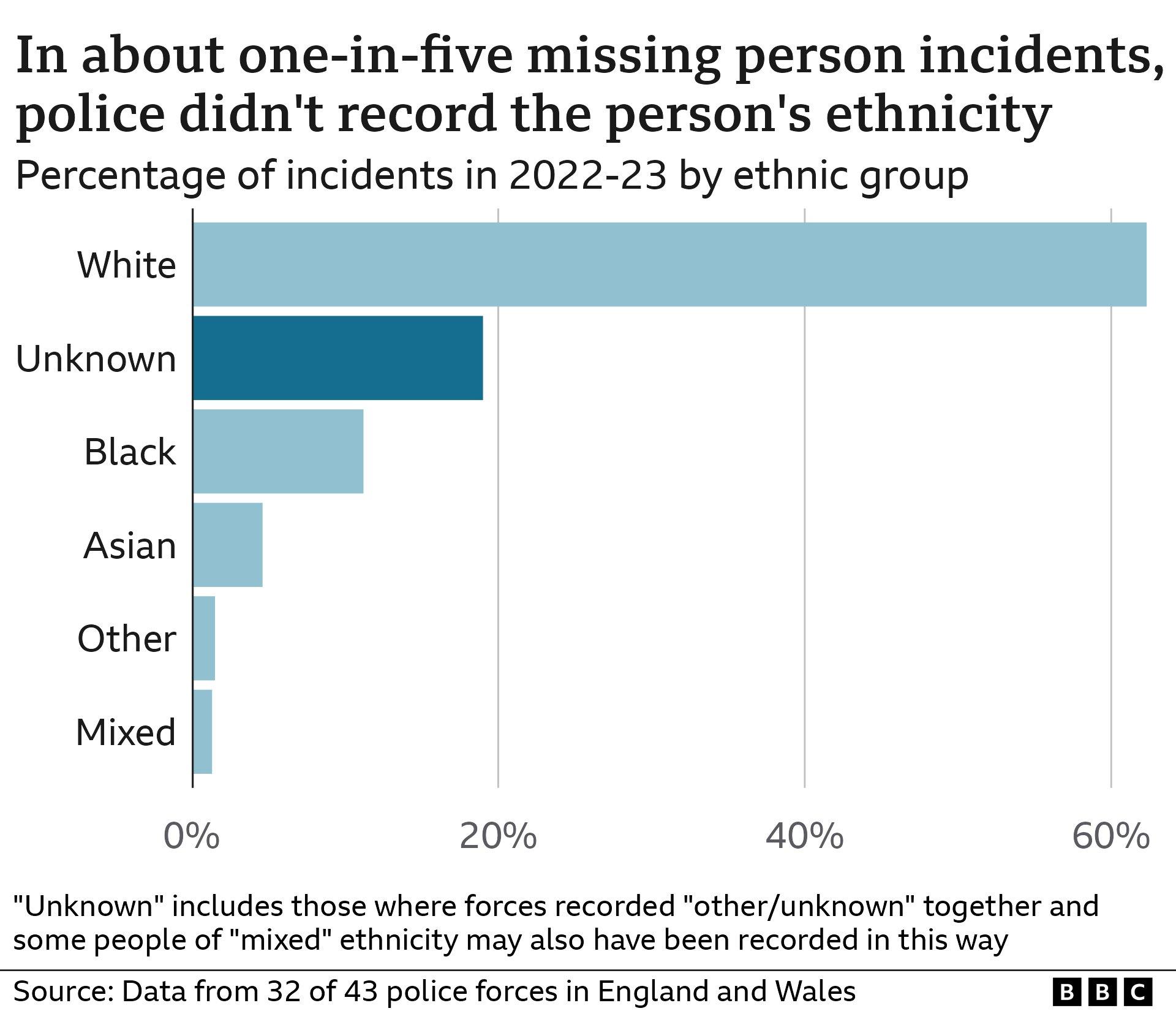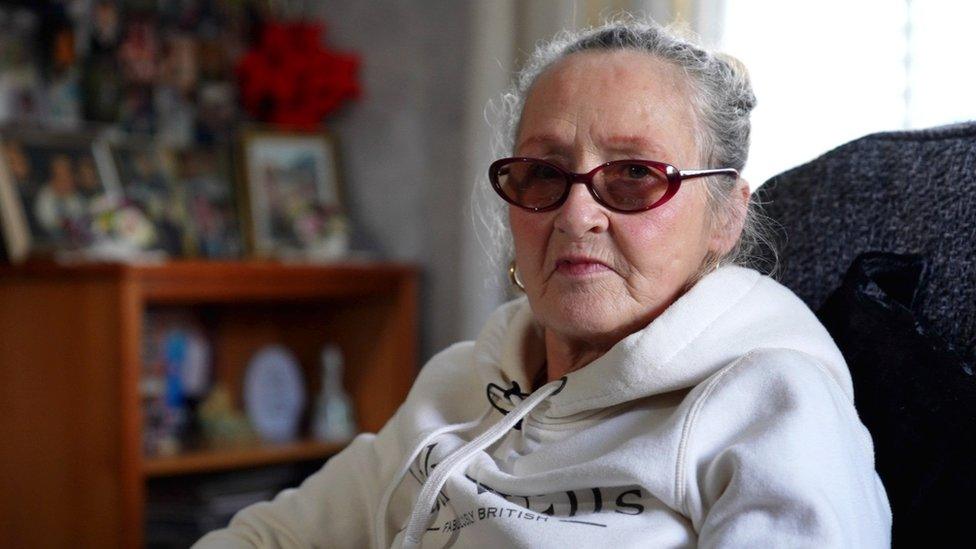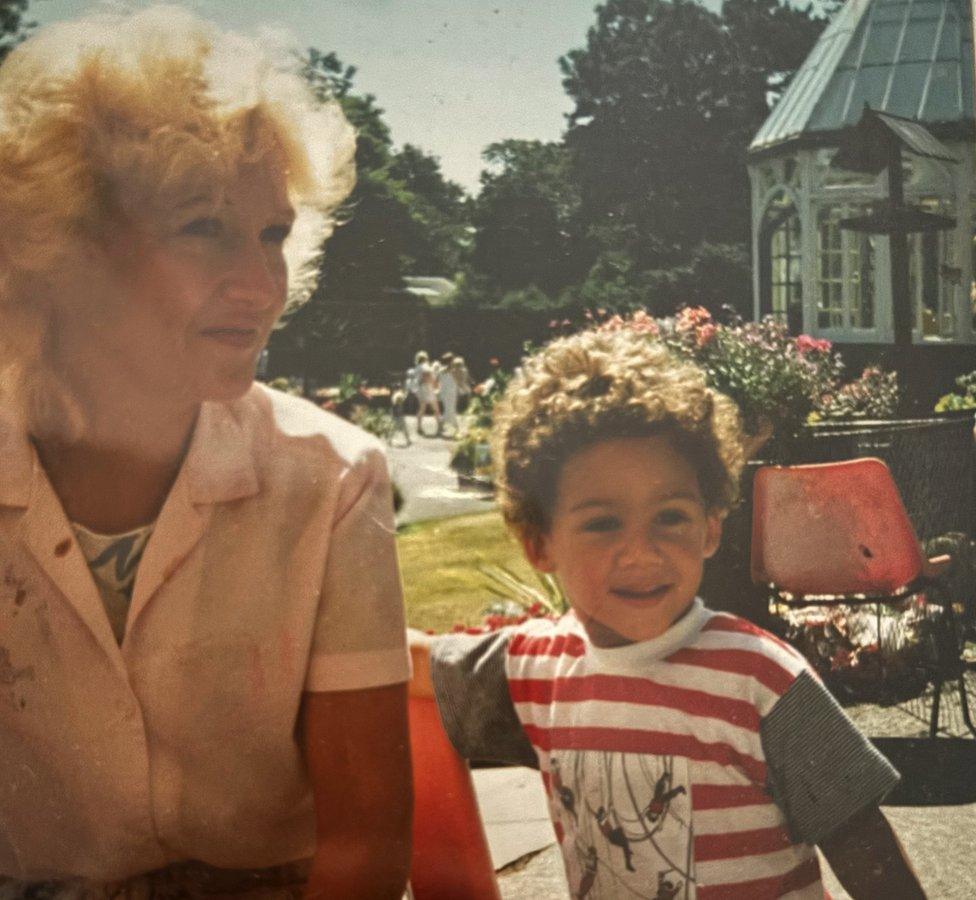Police not logging ethnicity of many missing people - BBC analysis
- Published

When Steven Durand went missing in 2018, the police incorrectly said he was white in appeals
Police forces are failing to record the ethnicity of many people reported missing, BBC analysis suggests.
In almost a fifth of all missing persons incidents in England and Wales in 2022-23, there was either no ethnic group recorded or the individual's ethnicity was marked "unknown".
Five forces failed to record an ethnicity in more than half their missing persons incidents.
The Home Office told BBC News it was funding a report into the issue.
The data was obtained by the BBC through Freedom of Information requests to police forces.
The National Police Chiefs' Council (NPCC), which has been asked by the Home Office to investigate the problem, said it is working with missing persons charities to understand why this is happening and make improvements.
People's ethnicity needs to be recorded accurately to help police identify if someone from a particular community is more likely to go missing, a charity told the BBC.
"Without data, it's really difficult to properly understand what's going on," said Jane Hunter, from Missing People.
Across England and Wales, almost 47,000 incidents were recorded by 32 police forces with "no", "other" or "unknown" ethnicity. Eleven others either did not respond or could not provide usable data.
"Unknown" was the most frequently recorded ethnicity other than white.

In Avon and Somerset, nearly 2,300 incidents had no ethnicity recorded - about 70% of its total.
Gwent Police recorded more than 1,000 of its 1,717 incidents as unknown, about two-thirds of the total.
About 59% of incidents in Wiltshire and 54% of incidents in Dorset had the ethnicity as "not stated" or "not recorded".
Cleveland Police also recorded almost 54% of its missing person incidents with "other/unknown" ethnicity.
A Dorset Police spokesperson told the BBC that in its region: "The ethnicity of a missing person is not known in every case, as the person making the report may not know this information at the time."
It said a person's ethnicity may also be inputted into a part of the online incident recording system which is not searchable or pulled into data.
The force said it changed its online form for reporting people missing last year, and that the new form "includes an option to specify the ethnicity of the individual".
It said whether or not the ethnicity is recorded in the initial stages does not affect the investigation that it carries out to locate and safeguard a missing person.
Avon and Somerset also pointed to a form it uses which does not include ethnicity. The same system is "used by multiple forces", it said.
"Other factors may include the circumstances in which a missing person is found," it said, adding that it is "committed to becoming a truly inclusive and anti-racist police service".
Gwent Police said the "ethnicity of those reported as missing is included as part of our initial information and evidence gathering, as we know this is important for spotting patterns of behaviour among certain communities".
It says it recognises it can record ethnicity more accurately and will work to improve this.
Cleveland Police acknowledged that the way it logs ethnicity data needs "significant improvement" and said it is a "primary focus".
The NPCC said this was a change that was being made on a national scale.
"The National Law Enforcement Database is currently being developed to replace the Police National Computer which will significantly improve data quality," it said in a statement to the BBC.
"This new database will have the capability to gather national statistics on missing people on one computer system, including ethnicity data."
'Somebody could have seen my son'
For Christine Durand, whose son Steven has been missing since 2018, the data is unsurprising.
She told the BBC that when Steven first vanished in Chorley, Lancashire, the police put out appeals stating that he was white, although he is mixed race.

When Christine's son went missing in 2018, the police got his ethnicity wrong in their appeals
"I thought, why've they put him as white?" she said, describing the first police appeal.
It took Lancashire Police several months to correct the error, Ms Durand says. This, she feels, could have stopped people from coming forward in the crucial early days.
"Somebody could have spotted him," she said. "He will talk to anybody, Steven. He's very sociable. So someone could have talked to him, and said, 'well no, he's mixed race, he's not white, so that can't be him'. It could have had an impact. But why did they get it wrong in the first place?"
In Lancashire, there were almost three times as many incidents where ethnicity was not recorded than those involving all other non-white ethnicities combined.

Christine feels Steven could have been spotted early on
Lancashire Police told the BBC it "understands how distressing this must be for [Steven's] mother".
"We do aim to record ethnicity of a missing person on our systems, but there could be a number of reasons why on occasion that may not happen, including the person providing the information not wanting to disclose it."
Steven is still missing. The police said anyone with information should call 101 and quote log number 0820 of 28 October, 2018.
Black people in 11% of cases
Analysis by the BBC also showed that black people are much more likely to be reported missing than people from any other ethnic background.
Black people made up at least 11% of missing person incidents among the 32 police forces that provided data, despite only accounting for 4% of the population.
When incidents where the ethnicity was "unknown" were excluded, the proportion of black people reported missing increased to almost 14%.
This is most stark in London where, according to the 2021 Census, just over 13% of the population is black. However more than a third - almost 36% - of missing persons incidents recorded by the Metropolitan Police in 2022-23, where ethnicity was known, were black.
In the West Midlands, over a fifth of missing persons incidents were recorded as involving black people, despite only 8% of the region's population being black.
The Met Police told the BBC it is "supporting national work with the [NPCC] lead and academics to better understand and respond to disproportionality in black communities, including missing black children".
West Midlands Police said it was setting up a scrutiny panel to work with it on missing persons cases - part of the Police Race Action Plan, launched in 2022.
The Home Office told the BBC: "We are committed to taking steps to improve police responses to these investigations.
"That is why we are funding the National Police Chiefs' Council to research issues of disproportionality and discrimination in the police response to missing persons investigations. The final report will be completed later this year."